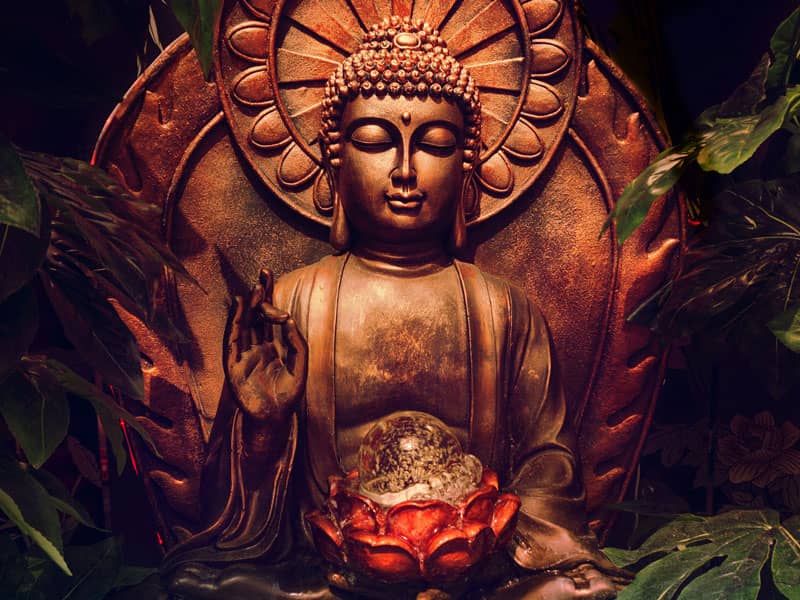The Three Jewels are the foundation of all forms of Buddhism, and the first jewel is the Buddha. The word buddha means "the Awakened One." And it doesn't mean only Shakyamuni Buddha, formerly the prince Siddhartha, who became a perfect buddha in the sixth century before the Common Era in India, whom we sometimes call the "historical buddha." Buddha means all those who have awakened from the sleep of ignorance and blossomed into their full potential.
Awakened and blossomed, they are teachers of others. That role is just as important as the fact that they're awakened themselves. Remember that awakening, freedom from suffering, salvation, if you will, liberation, omniscience, buddhahood, all come from your own understanding, your insight into your own reality. It cannot come just from the blessing of another, from some magical empowerment, from some sort of secret gimmick, or from membership in a group. It can't even come only through your faith, although some good faith may help. It can't come through meditation, either, at least not by meditation alone.
So, the most important element of Buddha to us, until we become buddhas ourselves, is that Buddha is a teacher, and he gives us a teaching. Now, teaching is not an indoctrination; it's not imposing a dogma. A teaching gives us a set of methods that we can use to develop ourselves, to learn, to think over, to meditate upon, and finally, to gain deep, profound, transforming insight, wisdom, and understanding.
Click here to check out Beliefnet's Buddhism Section!
So, we take refuge in the Buddha: Namo buddham sharanam gacchami. We turn to the teaching of the reality of bliss, the teaching of the method of achieving happiness in whatever form it comes to us, whether it comes as Christianity, whether it comes as humanism, whether it comes as Hinduism, Sufism, or Buddhism. The form doesn't matter. The teacher is Buddha to us, one who can point the way to our own reality for us. He could be a scientist; she could be a religious teacher.
The second jewel of refuge is Dharma-we take refuge in the Dharma: Namo dharmam sharanan gacchami. Dharma means "to be held." Dharma in its highest meaning means reality itself. Beneath that, it has a wide range of other meanings.
The highest meaning of Dharma is the reality reality that holds us in freedom from suffering, holds us in a state of bliss. Dharma is our own reality that we seek to understand fully, to open to fully. Dharma, therefore, also consists of those methods and the teaching of those methods that are the arts and sciences which enable us to open ourselves. The practices that we do, which will open us, which follow those teachings, which implement them in our lives, in our practice, and in our performance, which deploy those arts-they are also Dharma.
Ultimately, we take refuge in reality itself, because that is the only secure refuge. If we took refuge in any unrealistic thing, it could be blown down by this-and-that howling wind-but when we take refuge in reality, that is what endures. It is uncreated. It is not made by anyone. It lasts. It is there, and therefore it can give refuge. The final taking of refuge is embodying reality in our being, realizing that reality is our body and breath and thought and mind. Therefore, the final refuge is only being Buddha ourselves. But meanwhile, to whatever extent we can open to reality, we take refuge in reality, the second jewel.
The third jewel is the Sangha, the community of those who enjoy the jewels of refuge, who learn that teaching, seek that understanding, and work to embody that Dharma. They are consciously evolving toward being buddhas, sharing their understanding and bliss with others, as teachers of freedom to other beings, helping them discover these jewels. This includes all Buddhists everywhere and through time, in Sri Lanka, in Thailand, in Burma, in Tibet, in China, Korea, Mongolia, Japan, Vietnam, in ancient time and still now in India.
Namo buddham sharanam gacchami. Namo dharmam sharanam gacchami. Namo sangham sharanam gacchami.
All Buddhists say this, each in his own language. Namo means "I bow," meaning by bowing to express trust and faith and respect, to throw yourself on the mercy of another. Buddham is "to the Buddha." Sharanam means "refuge," a safe place of renewal, a resort. Gacchami means "I go." So, "I bow to Buddha and resort to him as refuge." Resort has a good double meaning, both "refuge" and "vacation resort," not just some pious act of going someplace and bowing to someone and then entering some sort of prison cell. It's like going for a rest, to relax, restore your energy, enjoy, to get some peace. A shramana is "one who goes to refuge" from suffering. We sometimes translate it as "ascetic." But I like to translate it as "vacationer," one who goes away and takes a break. Dharmam sharanam gacchami, "I take refuge in reality." I go there for a refuge. Sangham sharanam gacchami, "I take refuge in the community." I go there to join those friends who are taking a break.

